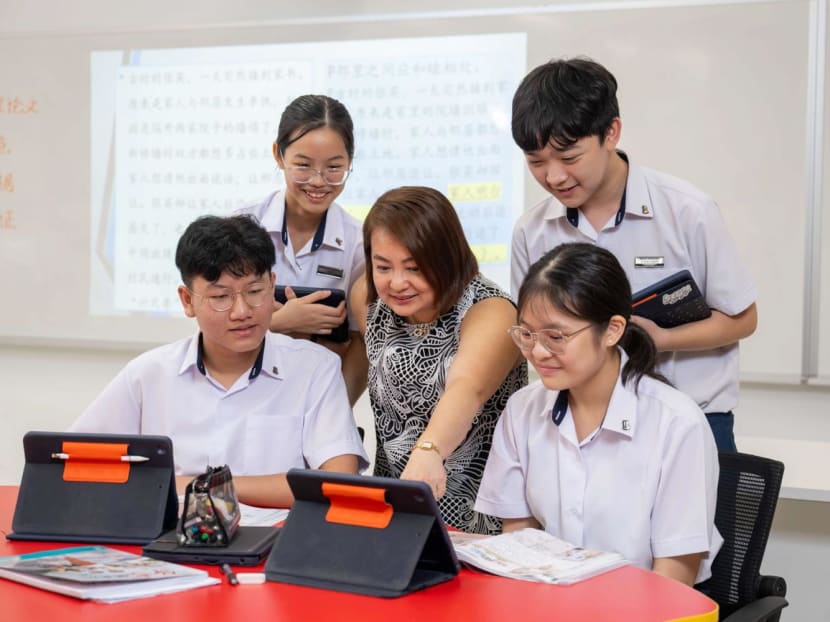MOE will protect teachers from 'unreasonable expectations' that affect their well-being
SINGAPORE — The Ministry of Education (MOE) will protect teachers from “unreasonable expectations” and conduct that affect their well-being, it said on Wednesday (Sept 18).

Secondary school students in a Chinese class.

This audio is AI-generated.
SINGAPORE — The Ministry of Education (MOE) will protect teachers from “unreasonable expectations” and conduct that affect their well-being, it said on Wednesday (Sept 18).
Speaking at the annual Schools Work Plan Seminar, Minister for Education Chan Chun Sing set "baseline" expectations for communication.
MOE needs to "set boundaries and recalibrate expectations" for what educators should and should not do, as well as what they need to do or are expected to do, he added.
Teachers should not be expected to respond to work-related messages outside of school hours, except in emergencies, said Mr Chan.
Noting that others would question what counts as "school hours", he stressed that the ministry is "reasonable".
Teachers start work at about 7.30am, he added.
"Within a normal work day, if it's not an emergency, beyond 5pm, you don't have to respond to whether tomorrow the (parent's) son must wear a brown or yellow T-shirt, right? Those are not important."
Teachers should also use their official emails and office numbers when contacting parents, said Mr Chan.
"I do not expect you to share your personal mobile numbers with parents. I don't want to make it a habit that you get buzzed at different times of the day."
All this will establish boundaries and allow teachers to focus on conducting classes and student activities, as well as have protected time after school hours to take care of their families, rest and recharge, said the education minister.
Mr Chan also announced other measures meant to streamline non-teaching duties to reduce teachers’ workload.
From 2026, schools can decide whether to continue offering both the applied learning programme and learning for life programme, or just one of the two, he said.
Schools will be given the autonomy to review and streamline the two programmes, enabling them to free up manpower for other priorities, said Mr Chan.
Applied learning programmes emphasise the application of thinking skills and connecting knowledge across subject disciplines, in areas including design, robotics and journalism.
Learning for life programmes focus on real-life experimental learning to develop students’ character and values, in areas including outdoor adventure, sports and visual arts.
The push for niche programmes was introduced in 2005, and the applied learning and learning for life programmes were introduced from 2014.
MOE’s existing efforts to streamline non-teaching duties have reduced teachers’ exam administrative load by 10 per cent, he noted.
With the introduction of the Singapore-Cambridge Secondary Education Certificate from 2027, the number of exam sessions will be reduced by about half, and invigilation load by up to 15 per cent.
The ministry will also pilot a process for parents to submit their children’s medical certificates online via Parents Gateway, to use technology to reduce teachers' workload, said the education minister.
The pilot will be conducted in 10 primary to pre-university level schools in the first school term of 2025, and progressively rolled out to all schools by the end of that year, said MOE in a separate press release.
Educators must adopt new mindsets towards their work, said Mr Chan, adding that striving for excellence is not the same as seeking perfection.
Teachers should not be held back by the fear of imperfection, he added.
“We should not expect to do everything for everyone at all times, at the same time... We don't need to be everywhere, everything, everyone, all at the same time. We are not superhuman beings," said the education minister.
"If we don't prioritise, we do ourselves a disservice. We also do our efforts and our students a disservice." CNA
For more reports like this, visit cna.asia.







